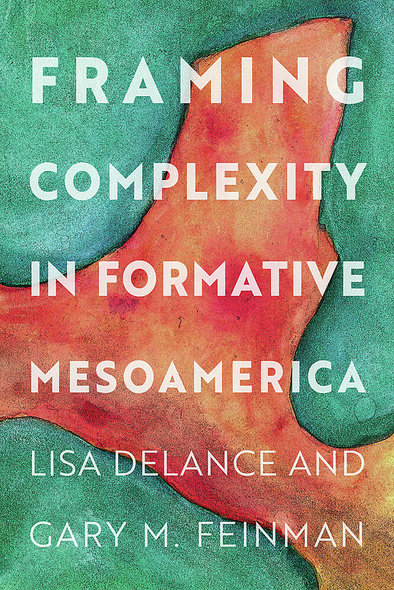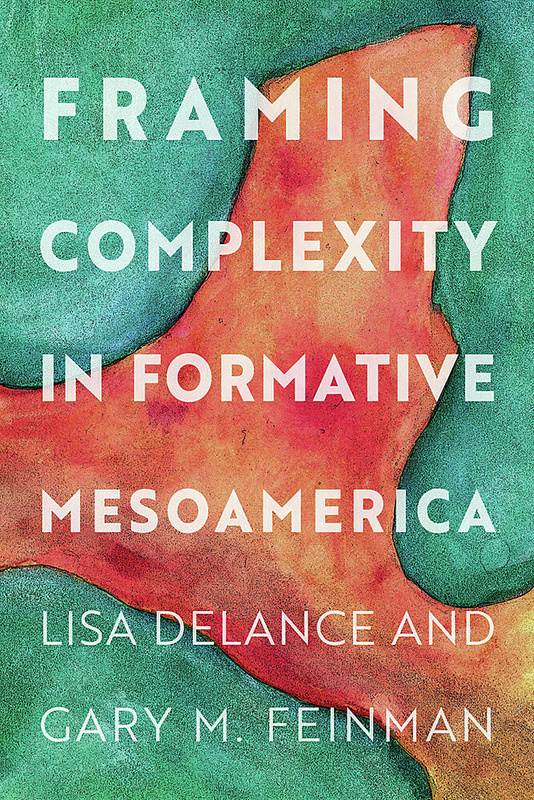Framing Complexity in Formative Mesoamerica
Edited by Lisa Delance and Gary M Feinman
University Press of Colorado
A fresh examination of variable social and economic processes, Framing Complexity in Formative Mesoamerica explores nascent social complexity during the Preclassic/Formative period in Mesoamerica and addresses broader social questions about egalitarian and transegalitarian prehispanic Mesoamerican cultural groups.
Contributors present multiple lines of evidence demonstrating the process of social complexity and reconsider a number of traditionally accepted models and presumed tenets as a result of the wealth of empirical data that has been gathered over the past four decades. Their chapters approach complexity as a process rather than a state of being by exploring social aggregation, the emergence of ethnic affiliations, and aspects of regional and macroregional variability.
Framing Complexity in Formative Mesoamerica presents some of the most recent data—and the implications of that data—for understanding the development of complex societies as human beings moved into urban environments. The book is an especially important volume for researchers and students working in Mesoamerica, as well as archaeologists taking a comparative approach to questions of complexity.
Contributors: Jaime J. Awe, Sarah B. Barber, Jeffrey S. Brezezinski, M. Kathryn Brown, Ryan H. Collins, Kaitlin Crow, Lisa DeLance, Gary M. Feinman, Sara Dzul Gongora, Guy David Hepp, Arthur A. Joyce, Rodrigo Martin Morales, George Micheletti, Deborah L. Nichols, Terry G. Powis, Zoe J. Rawski, Prudence M. Rice, Michael P. Smyth, Katherine E. South, Jon Spenard, Travis W. Stanton, Wesley D. Stoner, Teresa Tremblay Wagner
Contributors present multiple lines of evidence demonstrating the process of social complexity and reconsider a number of traditionally accepted models and presumed tenets as a result of the wealth of empirical data that has been gathered over the past four decades. Their chapters approach complexity as a process rather than a state of being by exploring social aggregation, the emergence of ethnic affiliations, and aspects of regional and macroregional variability.
Framing Complexity in Formative Mesoamerica presents some of the most recent data—and the implications of that data—for understanding the development of complex societies as human beings moved into urban environments. The book is an especially important volume for researchers and students working in Mesoamerica, as well as archaeologists taking a comparative approach to questions of complexity.
Contributors: Jaime J. Awe, Sarah B. Barber, Jeffrey S. Brezezinski, M. Kathryn Brown, Ryan H. Collins, Kaitlin Crow, Lisa DeLance, Gary M. Feinman, Sara Dzul Gongora, Guy David Hepp, Arthur A. Joyce, Rodrigo Martin Morales, George Micheletti, Deborah L. Nichols, Terry G. Powis, Zoe J. Rawski, Prudence M. Rice, Michael P. Smyth, Katherine E. South, Jon Spenard, Travis W. Stanton, Wesley D. Stoner, Teresa Tremblay Wagner
‘An innovative and up-to-date synthesis of artifactual, iconographic, and settlement pattern data that examines how diverse groups negotiated new social environments and economic interactions during Mesoamerica’s Formative period.’
—Jessica L. Munson, Lycoming College
'An excellent set of chapters provides new data and updated interpretations of pathways to complexity at a range of important sites from across the region. Anyone interested in the origins of social complexity in Mesoamerica or elsewhere should read this book.'
—American Anthropology
‘An important leap forward in the investigations into the origins of ancient Maya civilization.’
—Journal of Anthropological Research
Lisa DeLance is a lecturer in anthropology at California State Polytechnic University, Pomona, and the project archivist for the Belize Valley Archaeological Reconnaissance (BVAR) Project. Her research focuses on social complexity, state formation processes, negotiations of power, gender, and kinship.
Gary M. Feinman is the MacArthur Curator of Anthropology at The Field Museum, Chicago. He is the founding and contact coeditor for the Journal of Archaeological Research and has published more than 15 books and 200 scholarly articles, reviews, and chapters. His research interests include comparative studies of leadership, cooperation, and inequality; preindustrial economics; urbanism; and the complex relations between humans and environments over time.
Gary M. Feinman is the MacArthur Curator of Anthropology at The Field Museum, Chicago. He is the founding and contact coeditor for the Journal of Archaeological Research and has published more than 15 books and 200 scholarly articles, reviews, and chapters. His research interests include comparative studies of leadership, cooperation, and inequality; preindustrial economics; urbanism; and the complex relations between humans and environments over time.





